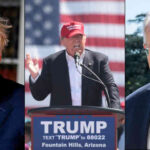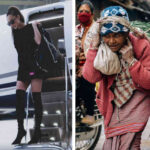The Bible is very clear that God’s people must care for the poor. The prophets, Jesus, his brother and the apostle Paul all spoke about it. (For some references on this, see note 1.)
But who are the poor? How poor are they? How wide is the gap between the rich and the poor? And where do you and I sit in comparison to the rest of the world?
In this post I research the statistics on poverty and inequality, and consider why inequality continues.
How to measure poverty & inequality
Two statistics are important here:
1. Poverty
People basic necessities needed to live a healthy and dignified life. This requires sufficient income or resources to eat, clothe themselves and have a roof over their heads. Poverty can also reduce access to healthcare and education, and the ability to live in peace.
So we need a measure of what level of income constitutes poverty, how many people are living in poverty, and which countries have high levels of poverty.
2. Inequality
A large gap between the rich and the poor doesn’t seem fair, and it has unhelpful consequences:
- It can deprive the poor of human rights and access to justice, education and political influence.
- Inequality tends to lead to less sustainable economic growth, by reducing tax paid, workforce skills and entrepreneurialism.
- It reduces social cohesion, which can lead to increased crime and violence.
Inequality can be measured in several ways (for more information on these, see note 2), either as a ratio of the wealth or income of the rich relative to the poor, or as a measure of how far each segment of society is away from the average.
How’s the world doing?
Poverty
Approximately 700 million people (about 9% of the world) live in extreme poverty (currently defined as a daily income less than $2.15 per day). The percentage of the world living in extreme poverty has fallen dramatically in the past two centuries, from about 75% in 1820, but improvement appears to have stalled since the Covid pandemic.
Poverty is somewhat dependent on the cost of living in each country, so there are several measures of poverty (as distinct from extreme poverty). About a quarter to a half (depending on the definition used) of the world is considered to live in poverty. Poverty can exist in otherwise wealthy countries – more than 10% of the US population is considered to live in poverty.
The poor tend mostly to be women and children, are less likely to have an education and often live in “fragile contexts”.
Inequality
There is enormous inequality of wealth and income globally.
- The average income of the global top 10% is 38 times the average income of the bottom 50%.
- The top 1.1% of the world’s population holds almost half global wealth, while the bottom 55% hold only 1.1%. Income is shared slightly more equally: the poorest 50% share 8% of income while the richest 10% share 50% of total global income.
- In 2018, the 26 richest people in the world held as much wealth as half of the global population (3.8 billion). On average therefore, each of these rich people held 150 million times more wealth than each of these poor people.
- The gap between the rich and the poor has increased globally over two centuries. Some meaures indicate it is still rising, while others suggest inequality has reduced this century.
- One feature of recent decades is the rise of global billionaires and the increasing wealth of the very richest.
Some countries have far more inequality within their population than do others.
- The countries with most inequality are generally located in Africa and Central & South America, while the least unequal countries are mostly located in western Europe.
- Among developed countries, the United States and United Kingdom have relatively high levels of inequality.
Overall, the inequalities between countries is decreasing while the inequality within each country is increasing.
As MIdnight OiI sang: “The rich get richer, the poor get the picture.”
Why do poverty and inequality occur?
Archbishop Oscar Romero is reported to have said: “When I give bread to the poor, they call me a Saint …. when I ask why the poor have no bread, they call me a Communist.” He was later assassinated.
But let’s try to answer, briefly, his question.
Direct causes
Potential causes of inequality include:
- lack of resources to earn a living,
- lack of education & opportunity,
- discrimination,
- conflict,
- technology displacing and changing jobs,
- corrupt governments,
- where you live – wealthier countries can more easily generate further wealth than can poorer countries.
Behind all this is the simple fact that most of us (and I include myself) who live in wealthier countries are not always willing to forego some of our wealth to provide for the poor. Sometimes it isn’t easy to know how to do better. An obvious example is paying a little more to purchase products made by workers receiving a fair wage – but the information to do this isn’t always available.
Can the majority poor do more to bring change?
The poor are the majority and the rich the minority, so can they make change and reduce inequality via a fairer distribution of wealth, progressive tax rates and higher wages?
According to two different measures (Refs 16 & 17), more than half the world’s people live in countries where they have no meaningful ability to change their government and its policies. Those countries are not effective democracies, but those in power are dictators or control the elections in some way to stay in power.
With modern technology, surveillance, and abusive power, the poor generally have no realistic options to change the government, gain higher wages or change taxation. “Stability in a dictatorship is maintained through coercion and political repression, which involves the restriction of access to information, the tracking of the political opposition, and acts of violence.” (Ref 18)
Sadly for the world’s poor, most of them don’t live in democracies. And the number of democratic countries has decreased slightly in the last decade (Ref 17).
Maintaining inequality in democracies
In theory, the lower paid half of a democratic country should be able to elect governments which will tax the wealthy and distribute wealth via social security, higher wages, government-sponsored education and health and so on. But it doesn’t always happen (Ref 19).
Call me a cynic if you like, but it seems the rich and powerful (generally) are not eager to share some of their wealth and power. So they need to get the majority to vote against wealth redistribution policies. How much this occurs, and how it is achieved, is a complex question (Ref 20). But simplifying, there are many ways the rich and powerful can achieve this:
- Greater influence on politicians via donations, media ownership, lobbying etc. There are those who claim this isn’t an important factor or that the rich have a beneficial impact on politics, but these seem to be mouthpieces of the rich, and the experts disagree (Ref 20).
- Repression and voter suppression making it more difficult for the poor to exercise their democratic rights (Ref 20). In the US, this voter suppression is sometimes done in the name of reducing election fraud, but rarely has significant election fraud been demonstrated.
- Close relationships between government appointments and wealthy companies, so that politicians can be rewarded with highly paid positions after they retire and the interests of the wealthy can be carried forward by selective government appointments (Refs 21 & 22).
- Information smokescreen: as the climate change debate as shown, it is always possible to present unfactual or misleading information to support an erronous case and so mislead the voting public. The ownership of mass media by the rich is an important factor in this.
- Division: if other issues than wealth inequality divide the voting public, voters may choose policies that are detrimental to wealth equality for the sake of some other value (Ref 19). This often involves setting one section of the public against another.
Feeding the hand that bites you?
This last factor is worth examining. In times of war or national emergency, people will generally be willing to sacrifice their self interest for the common good. So the trick is to convince the voting public that there is an issue so important that it obscures or negates the reality of inequality.
This will generally involve creating some sort of “them vs us” division, exaggeration of the policies of opponents and demonisation of opponents. Once the battle lines have been drawn, people will vote for their tribe against the “enemy” even if it is contrary to their own interests. To mix up a metaphor, they have fed the hand that actually bites them.
In western (and some other) countries issues that have been used to deflect attention from inequality and assist the election of parties that favour the wealthy include:
- Immigration: promote a fear of the country being swampled by refugees or illegal immigrants, often by misrepresenting the numbers.
- Socialism: calling policies that reduce inequality “socialist”, which can be made to sound evil, even though the policies don’t involve core socialist actions.
- Nationalism: a simple and often unclear claim to promote national interests (e.g. “Make America great again”) even at the expense of the majority of people who make up the nation.
- Religion: in some countries, promoting fear that other religions, or secularism, are taking away privilege can be used to distort the dominant religious public’s judgments.
A Christian view?
We believe in a God who cares for the poor and calls us to do the same. So we must be concerned about inequality, and be willing to act on it:
- Be generous, especially to those less privileged than we are.
- Financially support overseas and local aid, development and social welfare agencies.
- Where possible chose Fair Trade products, and research which companies are most ethical, to ensure poor workers receive a fairer wage.
- Vote for politicians who act to reduce gross inequality, not those who increase it.
We follow Jesus, who said he was the way, the truth and the life (John 14:6). So truth must be important to us too. To do this, we will have to be “as shrewd as snakes and as innocent as doves” (Matthew 10:16). We will need to love God with our whole minds (Matthew 22:37), so we can examine what we are being told and test it for truth, rather than just accept what comes from “our tribe”:
- Does what a politician say agree with what Jesus said, about caring for the poor, about forgiving and loving enemies and about putting others before ourselves?
- Does a politician’s character show they are following these ethics? Are they acting like a servant leader? Are they seeking self, power and reputation, or seeking to serve the people? Jesus said we’ll know people by the fruit (ethics) of their lives (Matthew 7:16-18).
- Are they using some emotive issue to scare us into voting for them? Remember God’s Spirit doesn’t lead us to fear (2 Timothy 1:7).
- Are they vengeful, mean-spirited, mocking of others, all attitudes condemned by the New Testament (Romans 12:19, Colossian 3:8-14)?
- Above all, can we test the truth of what they are saying before we accept it?
Thoughts?
Related Posts
References
- World Inequality Report 2022. World Inequality Database & World Inequality Lab.
- Inequality Measurement. Development Issues No. 2. UN, 2015.
- The many faces of inequality. SDG Pulse, UN, 2023.
- The Global Wealth Distribution. Visual Capitalist, 2021.
- List of countries by income equality. Wikipedia.
- How has income inequality within countries evolved over the past century? Our World in Data, 2023.
- Trends in Income Inequality and its Impact on Economic Growth. OECD, 2014.
- Inequality: Global Trends. Development Initiatives, 2023.
- Poverty, The World Bank, 2023.
- Economic poverty trends: global, regional and national. Development Initiatives, 2023.
- Ten Reasons to Care About Economic Inequality. The New Economcs Foundation, 2011.
- Rising inequality: A major issue of our time. Brookings Institution, 2023.
- Income Inequality: Introduction to Inequality. International Monetary Fund.
- Inequality – Bridging the Divide. UN, 2020?
- Global poverty and inequality in the 20th century: turning the corner? Australian Government, 2001?
- The Economist Democracy Index. Wikipedia.
- Democracy. Our World in Data.
- Dictatorship. Wikipedia.
- Wealth Inequality and Democracy. Annual Review of Political Science, 2017.
- Democracy, Redistribution, and Inequality. Handbook of Income Distribution, 2015.
- Why Do the Rich Have So Much Power? New York TImes, 2020.
- Captured Democracy: Government for the few. Oxfam, 2018
- Voter Suppression. Brennan Centre for Justice.
Notes
Note 1. Bible passages on helping the poor
- Isaiah 10:1-2: “Woe to those who make unjust laws, to those who issue oppressive decrees, to deprive the poor of their rights and withhold justice from the oppressed of my people”
- Isaiah 32:7: “Scoundrels use wicked methods, they make up evil schemes to destroy the poor with lies, even when the plea of the needy is just.”
- Jeremiah 5:27-28: “they have become rich and powerful and have grown fat and sleek. Their evil deeds have no limit; they do not seek justice. They do not promote the case of the fatherless; they do not defend the just cause of the poor.”
- Luke 14:13: “But when you give a banquet, invite the poor, the crippled, the lame, the blind”
- Mark 10:23: “Jesus …. said to his disciples, “How hard it is for the rich to enter the kingdom of God!”
- James 2:6: “you have dishonored the poor. Is it not the rich who are exploiting you? Are they not the ones who are dragging you into court?”
- Galatians 2:10: “we should continue to remember the poor, the very thing I had been eager to do all along.”
- Acts 9:36: “In Joppa there was a disciple named Tabitha (in Greek her name is Dorcas); she was always doing good and helping the poor.”
- 2 Corinthians 8:13-14: “Our desire is not that others might be relieved while you are hard pressed, but that there might be equality. At the present time your plenty will supply what they need, so that in turn their plenty will supply what you need. The goal is equality”
Note 2. Measures of poverty, wealth & inequality
Wealth and poverty measures can be based on income or wealth (assets).
Extreme poverty is defined as an income of less that $2.15 per person per day using 2017 prices. This is applicable to low income countries. Poverty in lower-middle-income countries and higher-middle-income countries is defined as an income of less than $3.65 and $6.85 per person per day respectively.
Wealth is sometimes measured as the proportion of total income or the share of total wealth held by the very rich, often defined as the top 1% in a country or globally. This is often compared to the proportion owned by the bottom 40% or 50%, thus measuring inequality, not just wealth.
Inequality is more difficult to assess, and several measures are commonly used:
- The Palma Ratio is the ratio of the richest 10% of the population’s share of gross national income divided by the poorest 40%’s share. A higher ratio indicates greater inequality between the rich and the poor. A ratio less than 2 indicates a low level of inequality, while a ratio greater than about 6 indicates a high level of inequality.
- Sometimes a measure of the ratio of the top 10% to the bottom 50% is used, only slightly different to the Palma Ratio.
- The 20/20 Ratio (quintile share ratio) compares how much richer the top 20% of populations are to the bottom 20%. Clearly it is similar to the Palma Ratio, but is perhaps easier to understand as the two groups being measured are equal in size. A 20/20 ratio of less than 5 indicates low inequality while more than 15 indicates high inequality.
- The Gini Index measures inequality across the entire population by comparing how far each segment of the population is from complete equality. It is the most commonly used indicator of inequality, but it is (i) complex to calculate, (ii) difficult to visualise and explain, and (iii) may not fairly portray the extremes of inequality. A Gini Index of less than 30% indicates low inequality while a GI of more than 50% indicates a high level of inequality.
Photo by Bethany Ferr.





A very well researched and presented analysis, I agree with pretty much all of it, although politicians can’t tax the rich too much otherwise they will take their money elsewhere.
The idea is to make it good for them to use their money to help the poor, maybe over-geared tax deduction for donations to certain charities. (e.g. if they give a donation of $100, they get a deduction of $110).
Putting more money into public education and less into private would reduce educational inequality (but ask yourself what schools most politicians send their own children to and we see a problem there).
Hi, yes I agree, the rich have ways to move money around that can make it difficult for governments to tax them. All this is clearly a battle that isn’t going to be won – after all, the extreme response of Communism didn’t work either! – but hopefully we can do a little better than we are at present.